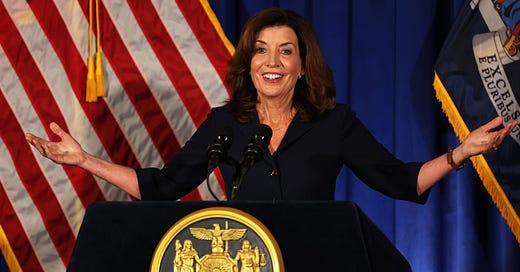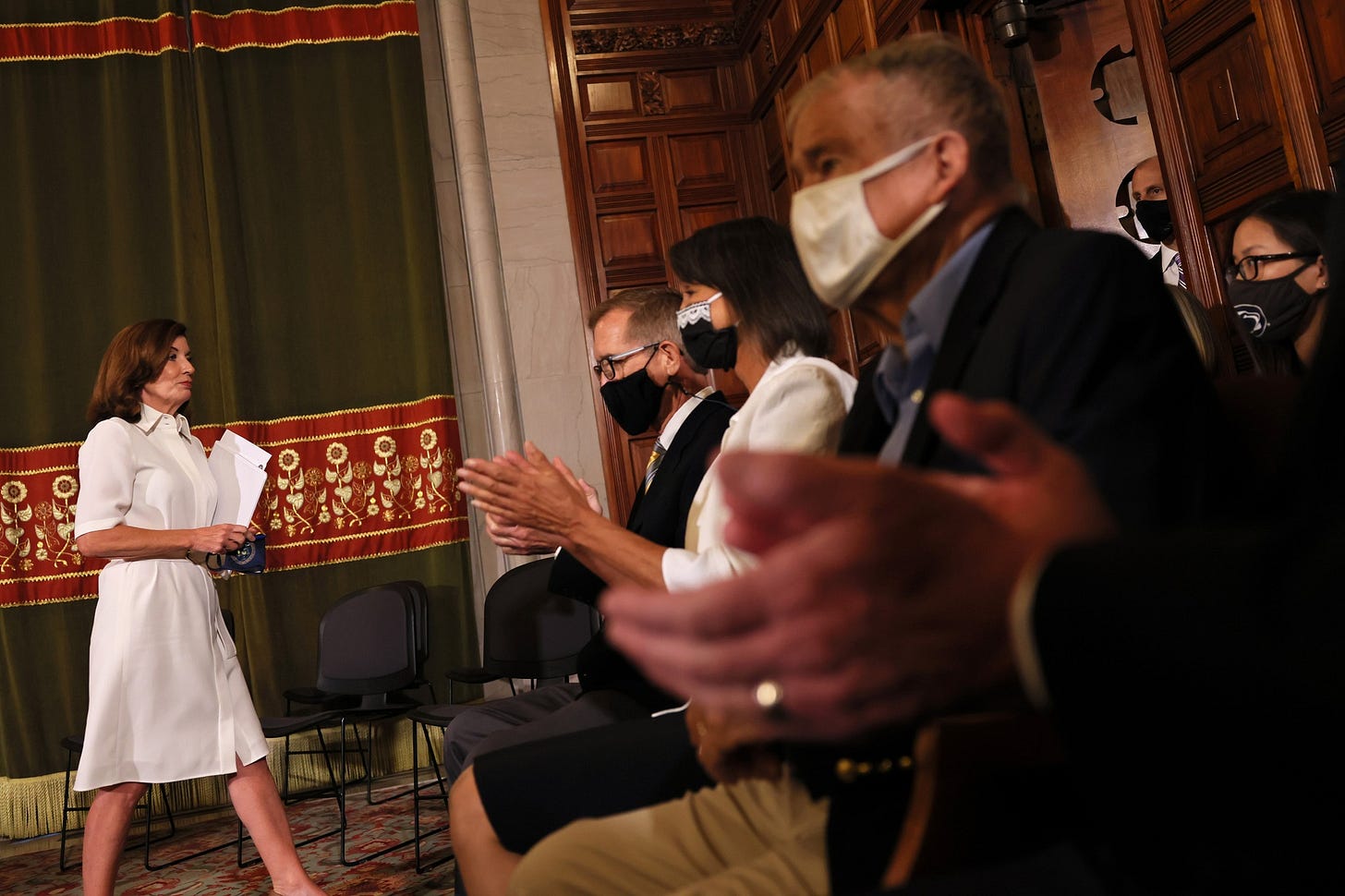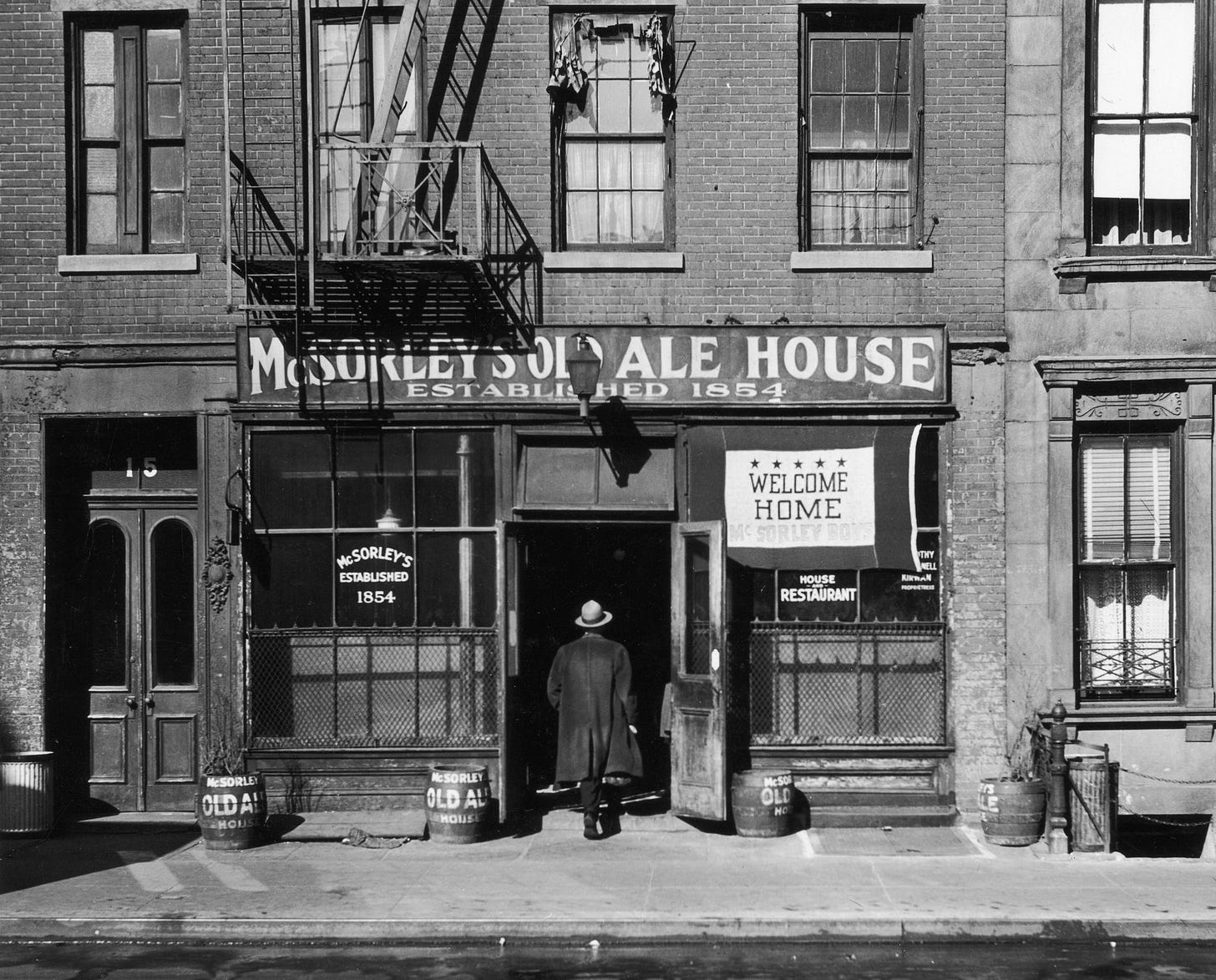New York’s First Female Governor Should Be a Case Study
“It’s almost like if there was a gender bias bingo card for women in politics, she’s got bingo.”
You’re a free subscriber to Wait, Really? For the full experience, become a paying subscriber.
I’m one of those New Yorkers who knows embarrassingly little about state politics. I’d never been to Albany before a few months ago; I don’t know the lingo of state government; I still don't entirely understand the complexities (and egos) of the annual budget negotiation, I just know that somebody is always mad about it.
So when I met Governor Kathy Hochul at a dinner for women journalists late last year, just a few months after she’d ascended to the position in the wake of Andrew Cuomo’s sexual misconduct scandal, I was intrigued. Warm and approachable, wearing a gold “Vaxed” necklace sold on Etsy, Hochul was confident and well-spoken. She had spent more than two decades in local politics, including six years as lieutenant governor, and emphasized her experience — and toughness — to stay in the top job. Yet most urban New Yorkers at that time could barely remember her name, let alone pronounce it (it’s Ho-Kuhl).
I pitched Hochul’s team on letting me profile the state’s first woman governor, who was embarking on her campaign to keep the top job. Not long after, I set off for Albany — that’s New York state’s capitol (yes, I knew that) — for a crash course in state politics and the state of the first woman governor within them.
I was sure that gender would be part of this story — thumping masculinity has long been New York’s political vibe — but what I didn’t anticipate was just how big a role it would play. Yet the more I learned about Kathy Hochul the more it seemed that, were social scientists to create a specimen of a woman politician — one who faces all of the complexities and double standards that come with that — they might have created Kathy Hochul.
Governor Hochul, after her swearing in last year. (Michael M. Santiago/Getty Images)
Like many women who end up in local office, Hochul never planned to be a politician. Though she had worked on Capitol Hill — before taking time off to raise her kids — the Buffalo-area native always saw herself as somebody behind the scenes. And yet, with small children at home, and frustrated by her town’s refusal to create a kids’ play space inside a soon-to-be remodeled McDonalds, she was galvanized to run for town board when a man half her age (and with none of her experience) raised his hand for the job. (She was a lawyer who had worked for a U.S. Senator; he was still living in his parents’ basement.)
She spent more than a decade in that job, where her style of work — which has tended to focus on relationships over brand-building (“I get stuff done, I just don't do it with a lot of noise,” she told me) — is almost textbook, as women don't have the luxury of self-promotion. She has a tendency to narrate her own toughness — she is “tough as nails,” “not to be messed with,” “from a steel town,” she often says — presumably to counteract the assumption that she’s nice, which of course she is, but women can't be seen as too nice or they're seen as ill-equipped to do the job.
But the most glaring gender dynamic surrounding Kathy Hochul is undoubtedly her proximity to male scandal, which has had a hand in her ascendence not just once, but at four distinct points in her career.
First, when she was promoted to county clerk in 2008 — by then-Governor Elliot Spitzer, who would resign in a prostitution scandal not long after.
Then, four years later, when she ran for Congress in a special election — winning the seat vacated by a man who had resigned in a scandal involving shirtless selfies and Craigslist. She would later lose that seat, by 1.4 percent, to a man who would end up in prison for securities fraud.
And then, of course, there was her former boss, Governor Andrew Cuomo, who resigned in August after a damning report into his conduct was released by New York’s Attorney General, Letitia James. James, as it were, also ascended to her position after a man’s scandal (her predecessor, Eric Schneiderman, resigned after multiple women accused him of physical abuse).
Honestly, you can’t make this stuff up.
New Yorkers Say: Cuomo's Got to Go! A plane flies over the State Capitol with a banner. (Bennett Raglin/Getty Images)
Social scientists have studied all of these things in silos for decades. But it’s rare that they coalesce on one woman. When I called up Marianne Cooper, a sociologist at Stanford University who studies women and politics, she told me: “It’s almost like if there was a gender bias bingo card for women in politics, she’s got bingo.”
Hochul will compete next week in the New York Democratic primary on June 28. She leads her opponents by double digits.
As The New York Times editorial board put it, in a recent endorsement of her: “Hochul has shown herself capable of tending to the state’s needs while leaving behind the drama and tiresome bravado of the many governors who served before her, a bracing change.”
Let’s hope so.
What else is on my mind:
Everyone is gay! A record number of adults in the U.S. identify as LGBTQ, according to the most recent Gallup survey, and one in five Gen Z adults identify as queer.
The never-ending story of Johnny Depp v. Amber Heard: Heard’s first prime time interview since the verdict in the defamation case brought by her ex-husband will air tonight at 8 ET on NBC.
RIP Internet Explorer. The web browser of my youth is finally retiring.
The word missing from the abortion debate: “Women”
Girls against guns: Students are mobilizing against gun violence, with young women taking the lead.
What happens in a country where abortion is banned? See: Poland
From the Archives: A Woman Walks Into a Bar....
McSorley's circa 1945 (Hulton Archive/Getty Images)
Fifty-two years ago this month, in 1970, McSorley’s Ale House — one of the oldest (and greatest) pubs in New York City, which served only beer, and for 116 years only served men — was ordered to open its doors to women. The ruling came after a lawsuit brought by the National Organization for Women, which resulted in a city ordinance banning discrimination in public places on the basis of sex.
Let’s just say the male patrons weren’t too happy about it.
“That woman is trouble,” one old‐timer in an open‐collar shirt said, as Lucy Komisar, a woman, approached the bar in a purple jumpsuit, sandals and sunglasses, as described by The New York Times. “All women are trouble,” he continued, shaking his head.
Later, when Komisar was asked by the bartender, John Smith, if she had had a good time at the saloon, she replied: “Not particularly. But politics is not always enjoyable.”
⏩ Forward this newsletter to a friend or sign up to get it to your inbox.
💬 Have thoughts to share? Email me at supwaitreally@gmail.com. (You can also just reply to this email.)
🙋🏻♀️ Follow me on Instagram or learn more about my writing and books here.








